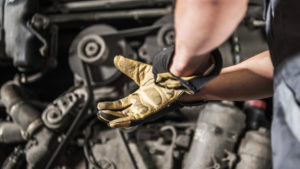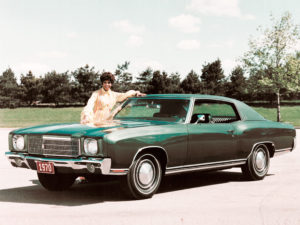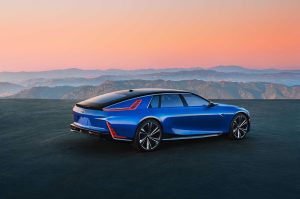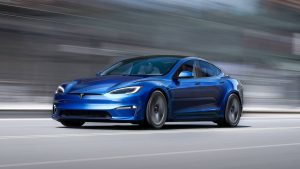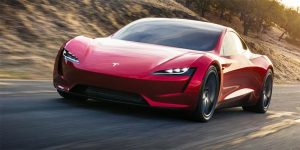Discord between generations is nothing new. In the ’60s and ’70s, peaced-out hippies were busy sticking it to The Man; these days, woke Millennials are thumbing ‘OK Boomer’ replies to, well, those same hippies who ditched the tie dye and musicals for a dyed tie and cubicles. The cycle will continue until either the fountain of youth is invented or a rogue comet destroys us all.
Plenty of ink has been spilled about Millennials and the car industry, most of reading as more dour than a Michigan winter. If one listened solely to the claptrap, they’d believe everyone under the age of 40 wants to burn their cars. While some so-called futurists are eager to predict the end of the personal automobile, what we saw at this year’s auctions in the Arizona desert proved that excitement about automobiles is alive and well with the young’uns … it simply takes a different form, that’s all.
The classic nameplates of the past don’t hold as much stock with the younger set, who are willing to highlight brands that they grew up revering, like Infiniti and Toyota.
Photo by Getty Images/iStockphoto
It’s not like new cars are nailed to showroom floors. According to the information dorks at Statista, the number of new car registrations in America has never been higher, climbing each year since 1990 save for a dip around the Great Recession. About 17 million new cars have been sold per year for the last five years. As per research group AdColony, 60% of car shoppers have yet to experience Freedom 55 and, more specifically, consumers between 35-54 prefer to buy an SUV (48%) over consumers between 18-34 (37%).
Why? Personal expression, perhaps. Those who are interested in splashing out money on new wheels may be more likely to select something that isn’t like every other machine on the road. As well, buying a home and raising a family is also more expensive than ever, so a cheaper option usually manifests itself in something that doesn’t take the form of an SUV.
A recent study cited by Forbes found that the top three car models most owned by Millennials are Honda Accord, Nissan Altima, and Honda Civic.
New cars are one thing. But, as anyone who lives within a country mile of an ardent gearhead will tell you, driving and owning a ride from days past is the mark of someone who is truly passionate about cars. In this group, the zealous automotive fires burn white hot.
Ryan ZumMallen, reviews editor at Edmunds and author of the car culture book “Slow Car Fast“, rightly pointed out that a good chunk of Millennials aren’t kids anymore. “They’re grown adults who are ready to leverage their spending power on items that were influencing them in the ’80s and ’90s.” He referenced the Youngtimer’s collection at auction house RM Sotheby’s, a collection of European and Japanese automobiles from that ear which brought big bucks last year. Those types of cars, ZumMallen explained, would have been shunned at such events just a few short years ago. Now, these auction houses are going through great lengths to attract younger buyers for such machines.
One can also make the case that Millennial auto enthusiasts are not singularly focused on one particular trend or type of vehicle. Their diversity, both in terms of demographic and car choice, is a strength largely unharnessed by previous generations of gearheads. It is this author’s opinion that this is juicing values of a variety of collector vehicles – vintage Broncos capable of spinning up dirt in quantities to satisfy the hygiene needs of six Persian cats and Japanese sports cars with retina-detaching performance are but a brace of examples – but perhaps not into the stratosphere the market once saw with the likes of zillion dollar Hemi ‘Cudas.
Millennials are transforming the way most of the world thinks about cars using a variety of platforms aside form the traditional car show, like YouTube.
Photo by Getty Images/Westend61
A tremendous real-world example? While attending this year’s Barrett-Jackson soirée in Scottsdale, we witnessed BMW Lightweights hammering away for prices deep into six-figure territory. These cars, from a collection that belonged to Paul Walker, undoubtedly drew some of their fiduciary strength from an association with a famous car-adjacent actor and his proximity to a certain movie franchise. However, there’s an argument to be made that something else – something Millennial – is afoot here as well.
The democratization of speed has reached a zenith in the last couple of years. One can walk into a new car showrooms of several different brands and drive away in a machine with over 700 horsepower. Hellcats, GT500s, and even the scattered Jeep (Jeep!) have placed sky-high levels of grunt into the disgustingly sweaty palms of anyone who can keep up a repayment schedule. Even a V6-equipped Toyota Camry can run to 60 mph from rest in less than six seconds and will, in fact smoke the on-a-retro-pedestal Integra Type R by about two seconds in the quarter mile.
But no one will argue that a Camry provides any semblance of joyful motoring. That’s yet another insight into why cars like the E30 3-Series and ’90s-era Toyotas and Mazdas are enjoying a renewed fetishization – their ability to provide an exaggerated and less sanitized sense of speed, even though the car itself may be ultimately slower. It also doesn’t hurt that, as adults, Millennials have the scratch to spend on cars they simply desired as teenagers. Whether they developed that aspiration through playing Forza on Xbox or watching bracket racing at the local track matters not one whit. We’re witnessing one of the greatest shifts in buying power and era of influence the car game has ever seen – and yours truly is glad to be along for the ride.
Discord between the generations? That’ll be a reality as long as there are people of different ages on this planet. People with disposable income buying what they like? That, more than ever, seems to be the tie that binds.




